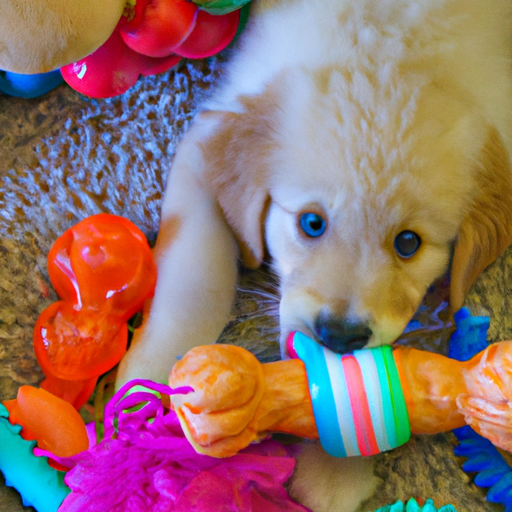Introduction
You’re on an exciting journey with your new puppy. One of the stages you’ll navigate together is teething. This phase can be challenging for both you and your furry friend. But don’t worry, you’re not alone. This guide is here to help you understand what to expect and how to provide the best care for your teething puppy.
Understanding Puppy Teething
Your puppy’s teething process is similar to a human baby’s. It involves the loss of baby teeth and the growth of permanent adult teeth. Here’s a general timeline:
- 2-4 weeks: Deciduous or baby teeth start appearing.
- 3-6 months: Baby teeth start falling out, and adult teeth begin to emerge.
- 6-8 months: Most puppies have all their adult teeth.
Remember, these are estimated timescales. Don’t panic if your puppy doesn’t follow this exact timeline.
Recognizing the Signs of Teething
Your puppy can’t tell you they’re teething, but they can show you. Here are some signs to look out for:
- Excessive chewing
- Drooling
- Decreased appetite
- Red, swollen gums
- Visible teeth emerging
How to Comfort Your Teething Puppy
Teething can be painful for your puppy, but you can take steps to alleviate their discomfort:
- Provide Chew Toys: Choose safe, puppy-approved toys that can soothe their gums.
| Toy Type | Pros | Cons |
|---|---|---|
| Rubber toys | Durable and safe | May not interest all puppies |
| Plush toys | Soft and comforting | Can be shredded easily |
| Teething toys | Designed for teething | May be more expensive |
- Freeze Treats: Frozen treats can numb your puppy’s gums and provide relief. You can freeze carrots, apples, or special puppy teething treats.
Training Your Puppy During Teething
Teething is the prime time for your puppy to develop chewing habits. Here’s how you can guide them:
- Encourage Appropriate Chewing: Whenever your puppy chews on their toys, reward them with praise or treats.
- Discourage Inappropriate Chewing: If they chew on something they shouldn’t, redirect their attention to their toys.
When to Visit the Vet
While teething is a natural process, there are times when you should consult a vet:
- If your puppy shows signs of extreme discomfort or distress
- If there’s excessive bleeding or if the gums look infected
- If baby teeth don’t fall out and adult teeth start growing in
Maintaining Your Puppy’s Dental Health Post-Teething
Once your puppy has all their adult teeth, it’s time to start a dental care routine:
- Brush Their Teeth Regularly: Use a dog-friendly toothpaste and brush.
- Provide Dental Chews: These can help clean your dog’s teeth and freshen their breath.
- Schedule Regular Vet Check-ups: Your vet can spot any dental issues early.
Frequently Asked Questions
Q: When does puppy teething end?
A: Generally, by the time your puppy is about 6-8 months old, they should have all their adult teeth and teething should end.
Q: My puppy is chewing everything. What should I do?
A: Provide plenty of appropriate chew toys and use positive reinforcement to encourage your puppy to chew on them instead of your belongings.
Q: Can teething cause my puppy to be less active?
A: Yes, teething can sometimes make puppies feel uncomfortable and less interested in play.
Remember, every puppy is unique, and this guide is meant as a general overview. Always consult with your vet for advice tailored to your puppy’s specific needs. Teething can be a challenging stage, but with your loving care and guidance, your puppy will get through it with a healthy, shiny set of adult teeth.



